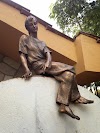During our plenary session in Mariannhill three publications were "officially" presented to us. The first one is "The Living Rosary" by emeritus bishop Hubert Bucher (he was the bishop of Bethlehem Diocese). He joined us one afternoon and told us about it.
As we read in the introduction: "Bishop Hubert Bucher pays excellent tribute to this great prayer and proposes a very practical way of keeping up an unbroken chain of Rosary decades. He explains clearly how to pray the Rosary. He chooses very suitable Gospel texts to guide prayerful meditation in each decade in this magnificent prayer of which 18 of the 20 mysteries are directly centred on Jesus Christ. The pictures which accompany the text make the reading easier and more attractive"
The second one was prepared by the Department for Christian Formation, Liturgy and Culture of our conference and is a new ritual for the Sunday celebrations in the absence of a priest. In many dioceses of our Bishops' Conference, the community is able to celebrate Mass only once or twice a month. The rest of the month, the celebration is lead by a team of two or three people.
"The initial draft was approved for experimentation by the Conference at the January 2010 Plenary and the final edition was approved by the August 2012 Plenary. The text uses the relevant extracts from the Roman Missal (3rd edition), and The Liturgy of the Hours (3rd edition).
Adequate catechesis is important and should make clear the difference between the celebration of the Mass and a communion service in the absence of the priest. Emphasis also needs to be placed on fostering and praying for vocations to the priesthood, asking God to bless the Church with priests so that no community goes without the Sunday Celebration of the Eucharist."
The final one is a new edition of the New Testament in Zulu language. It is the first fruit of the team work of the dioceses members of the Zulu Pastoral Region (Durban, Dundee, Eshowe, Ingwavuma, Mariannhill and Umzimkhulu). Priests, religious, lay people and bishops have been involved in this project for many years.
Once the new translation of the New Testament was ready, it was decided to print it to make it known to the people of the KwaZulu-Natal province and other areas of the country where Zulu is spoken.
At the same time, the team of translators started working on the Old Testament.






